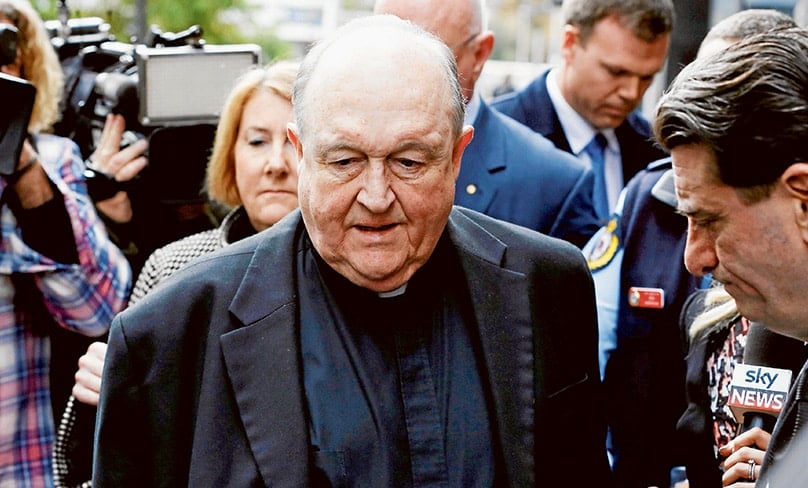
As you would have read elsewhere in this week’s paper, the conviction of Archbishop Philip Wilson for failing to report child sexual abuse was overturned last week.
Archbishop Wilson’s conviction was big news; one-time President of the Australian Catholic Bishops Conference, he was the highest-ranking member of the clergy in the world to be convicted of concealing child sexual abuse. The overturning of this conviction, then, is similarly very big news.
But in all of the media coverage about the case, there is amazingly very little known about the actual evidence. So I think it is important – very important – to try and provide a quick summary of what happened and the conclusion of Judge Roy Ellis.
A man named Peter Creigh, now in his 50s, alleged that he was indecently assaulted by Father James Fletcher in 1971, when Mr Creigh was 10 years old. No one disputed this claim. Fletcher died in prison in 2006 while serving time for indecently assaulting another boy. Where Archbishop Wilson comes into the picture is that Mr Creigh also alleged that in 1976, he told then- Father Wilson about the indecent assault.
Importantly, the charge against Archbishop Wilson was not that he did not make a report to police in 1976, but that he did not do so between 2004, when Fletcher had been convicted of abusing another boy, and 2006, when Fletcher died in prison.
In order to convict Archbishop Wilson, the prosecutors had to prove – beyond reasonable doubt – that in 1976, Mr Creigh complained to Archbishop Wilson that he had been indecently assaulted by Fletcher, that between 2004 and 2006, Archbishop Wilson remembered the conversation and believed the assault had taken place, and that he also believed the information he had would have been of material assistance in securing the prosecution of Fletcher.
Archbishop Wilson told the court that he did not recall any such conversation and, given the gravity of what Mr Creigh was alleged to have said, he imagined he would have remembered it if it occurred. Having someone tell you that they had been abused is not something you forget, after all.
Even though the lower court decided that the case was proven, Justice Ellis ultimately found there was reasonable doubt.
In his reasons, without wanting to criticise Mr Creigh and without suggesting he was being dishonest, Justice Ellis noted that the first time Mr Creigh reported the abuse to his family was in 2009, a time period which is not uncommon for abuse victims.
Even then, Mr Creigh also did not report the assault by Fletcher to the police, notwithstanding that Fletcher had died in prison while serving a sentence for a similar crime.
Judge Ellis also noted that the first time Mr Creigh recounted the conversation he claimed occurred with then-Father Philip Wilson was in 2013, some 37 years after the conversation was alleged to have occurred.
In the various times that Mr Creigh recalled the conversation with Father Wilson, there had been inconsistencies relating to when the conversation occurred, how long the conversation went for, where the conversation occurred and what Father Wilson had said, the period over which he was abused by Fletcher and the frequency of the abuse.
With all of that combined, Judge Ellis thought that there was at least reasonable doubt that the conversation occurred. While this on its own was enough to acquit Archbishop Wilson, the judge also considered whether, even if the conversation had taken place, Archbishop Wilson believed it to be true.
Archbishop Wilson had told the court that when allegations are made, he tries to keep an open mind about their truthfulness, unless there was a confession or conviction, when he would obviously be more inclined to believe it.
Maybe, because our court system based on the principle of ‘innocent until proven guilty,’ Justice Ellis thought that this was a perfectly reasonable attitude for Archbishop Wilson to have.
For this reason too, the judge thought there was reasonable doubt as to whether Archbishop Wilson believed the allegation, and so found another reason to overturn the conviction.
It is also worth noting some of the overriding comments the judge made. He acknowledged that “the Catholic Church as an institution has a lot to answer for in terms of its historical self-protective approach to children complaining of sexual abuse at the hands of some of its priests,” but that he could not punish Archbishop Wilson for the failings of the Church or of the paedophile priest in question.
He also acknowledged the media interest in cases such as these, but made it clear that media pressure and the weight of public opinion should not undermine the independence of the judicial system.
In the current climate where, understandably, people want to see someone go to prison for the crimes and cover ups that occurred, the judge’s insistence on independence from external pressures seemed to have made a big difference here. Good on him.
